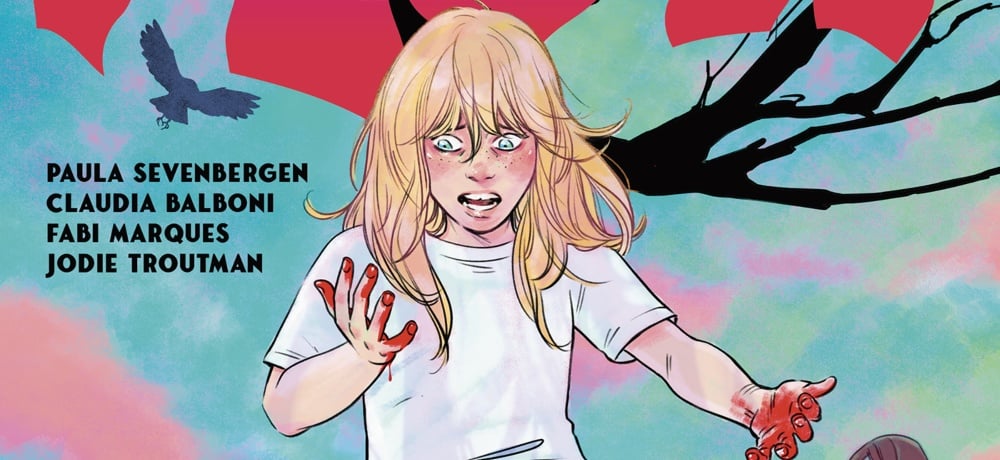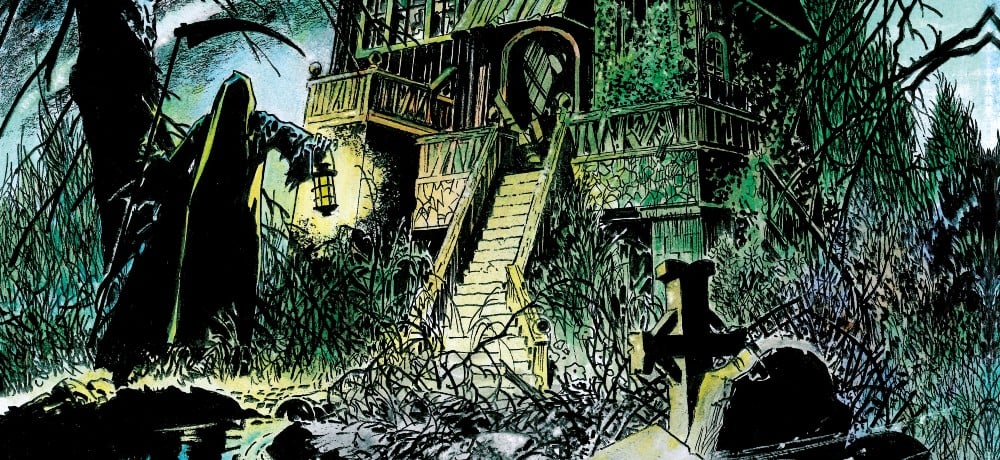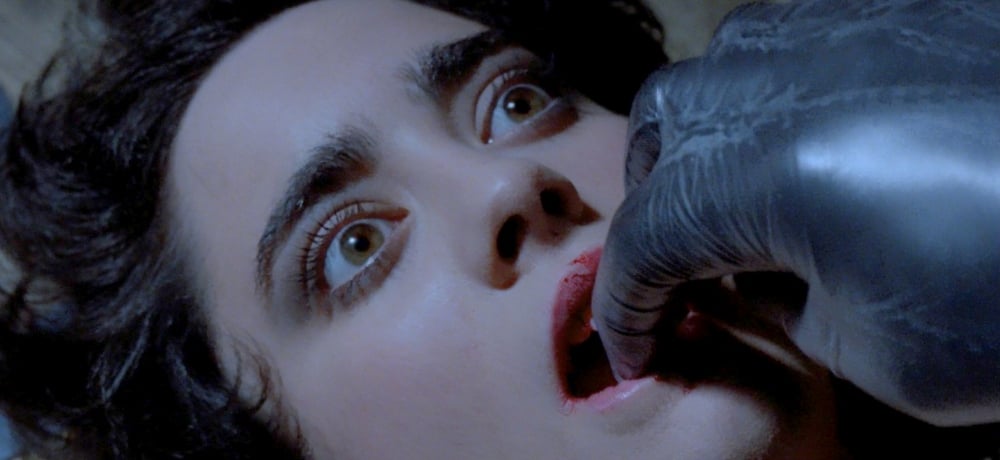






[This October is "Gialloween" on Daily Dead, as we celebrate the Halloween season by diving into the macabre mysteries, creepy kills, and eccentric characters found in some of our favorite giallo films! Keep checking back on Daily Dead this month for more retrospectives on classic, cult, and altogether unforgettable gialli, and visit our online hub to catch up on all of our Gialloween special features!]
This time, our director OD’d on weird. It isn’t like the movies.
With Opera, Dario Argento creates an inescapable waking nightmare of violence and voyeurism that could also be considered one of the Maestro’s most unapologetically philosophical and introspective entries in his entire filmography. Throughout Opera, Argento boldly toys with Giallo conventions in a variety of unique ways, often blurring the lines between reality and imagination, and examines the effects of trauma that haunt both Opera’s protagonist and antagonist alike.
Go back to horror films. Forget opera.
Even though Opera feels very much in line with Argento’s sense of style as a visual storyteller, there’s something incredibly singular about his approach to his cinematic clash of high art and Giallo-infused hysteria. While there is certainly a mystery that propels the film’s narrative, one involving an up-and-coming soprano named Betty (Cristina Marsillach), who finds herself taking on the role of a lifetime in a bold, revisionary opera production on Macbeth from horror film director Marco (Ian Charleson), who may have bitten off more than he can chew. Between the battle-worn sets, back projection, and a murder of unruly ravens, Marco clearly is looking to make his creative mark on a world he doesn’t necessarily fit into, and Betty’s lack of experience leaves her feeling just as daunted as her director, unsure if she’s truly ready to step into the spotlight.
But there is someone who believes in Betty—an unknown entity who clearly fantasizes about her, and makes the burgeoning singer the centerpiece of his deadly murder spree. And as the body count surrounding Marco’s production begins to rise, it’s up to Inspector Alan Santini (Urbano Barberini) and his partner Daniele Soavi (played by director extraordinaire Michele Soavi) to try and stop the killer’s reign of terror once and for all.
Betty’s journey is front and center in Opera, but I find Marco’s story arc in the film extremely fascinating, as it clearly feels like Argento is using the character to project his own insecurities and work through some real-life creative frustrations throughout this story. There’s an intimacy to the filmmaking in Opera, between the role of Marco as well as how up close and personal the camera often gets throughout the film, resulting in an experience that is as vulnerable as it is horrifically unsettling.
You’ll just have to watch everything.
In the first murder scene that Betty finds herself helplessly forced to watch in horror while the killer attacks her boyfriend, Stefano (William McNamara), she’s tied to a pillar, with her mouth covered in tape and the assailant has taped a row of small needles just below Betty’s lower eyelids. Before he attacks Stefano, the killer warns Betty that if she dare closes her eyes, her lids would be shredded as a result, which forces the innocent ingénue to bear witness to the grisly and unflinching violence as it unfolds. And in Opera, the deaths are all brutally invasive, with Stefano’s hands and upper torso being stabbed repeatedly. Once he’s finished, Stefano’s executioner allows Betty to go free, but doesn’t provide a reason behind his unexpected decision.
It’s a technique the masked killer utilizes once again when he attacks Guilia (Coralina Cataldi-Tassoni), the seamstress, who happens to stumble upon a clue to his identity the next day. After she discovers a mysterious bracelet entangled in Betty’s costume, Guilia realizes there’s a worn-down inscription on it, and figures out that it must tie into the murderer’s motivations. But before Guilia can fill Betty in on her discovery, the young singer is once again held against her will. This time, the songstress is placed inside a costume display case, with the killer once again mandating that she is to observe his merciless actions, which involve removing the bracelet that Guilia swallows by cutting a hole in her throat so that he can retrieve the incriminating jewelry. Before he leaves, the killer subtly reminds Betty of the power he holds over her, pushing the scissors close to her abdomen as a warning before he sets her free.
By having her character as a witness to these vicious crimes, Argento makes Betty, and ultimately us as the viewers, complicit in these murders. It’s a confrontational and masochistic approach that serves Opera well. And in some ways, it feels like the director is also challenging himself and his use of violence as a storyteller here as well. Opera is about the observation and fetishism of the inhumane acts that we commit against one another, and through a series of flashbacks, Argento lays out just exactly why Betty has been chosen by the killer. It’s because, even as a child, Betty has always been surrounded by acts of cruelty, malice, and rage, and we see how that trauma nearly consumes her all these years later, and ultimately leads to the death of the homicidal perpetrator during Opera’s epilogue, too.
And in regards to the intimate nature of Opera’s filmmaking, the greatest example of that comes during the innovative death scene of Mira (Daria Nicolodi), Betty’s agent who makes the unfortunate mistake of looking through a peephole at the worst possible moment. It’s a shocking, ghastly moment in Opera, and it might just be one of the greatest cinematic deaths that Argento has ever concocted in his career (which is saying a lot when you consider just how impressive Argento’s efforts have been whenever it comes time to bid one of his characters adieu).

I can’t decide whether it’s just a dream… or the memory of something that really happened.
Opera also seamlessly blends elements of the real and the imaginary, which are heightened by Betty’s confusion and paranoia. She’s often an unreliable narrator in the film, despite the fact that she’s in attendance for most of the deaths (barring the stagehand who meets the pointy end of a hook during her first onstage performance). We’re left wondering just what exactly is going on after Betty confides in Marco that what’s been happening to her somehow connects to these nightmares she’s had ever since she was a child. There are numerous shifts in time and place throughout Opera, leaving viewers to try and figure out just where exactly the Maestro is taking us on this particular cinematic journey.
Argento and his cinematographer Ronnie Taylor also do a fantastic job of keeping us guessing throughout Opera. By often changing the first-person POV camerawork to represent different characters’ perspectives, it plays up the mystery at the center of the story, and allows Dario to push boundaries in ways he hadn’t really attempted before in his career. We even experience the POV of the ravens being utilized in Marco’s avant-garde interpretation of Macbeth, and beyond the fact that it allows for some dazzling camerawork, this bird’s eye view becomes a crucial element in Opera’s audacious reveal, where the ravens expose that it was Santini who had been behind Betty’s ongoing torment and the series of grisly murders as well.
All I wanted was your love.
At the heart of Opera is a pattern of trauma, in the form of everything that Betty has endured and with Santini, too. While he’s most definitely a villain, and Argento never once tries to excuse his behavior, we learn that his warped fascination with Betty came about because of the emotional and sexual manipulation he experienced at the hands of her mother decades prior. She demanded Santini carry out heinous murders as a means of satisfying her own cruel desires, and eventually it drove him to murder her in the end.
It’s also worth noting that I don’t think it’s a coincidence that it’s Macbeth that is the story featured in Opera, as both Santini and the titular character in Shakespeare’s story both suffer from PTSD, and the condition causes them both to lash out in very destructive ways, ultimately leading them towards a tragic fate in the end.
It’s unclear as to whether or not Santini continued to indulge in these murderous activities prior to the events of Opera, but he does admit in the finale that once he laid eyes on Betty, it awakened something deep inside him. He sees the young singer as the reincarnation of her mother, and that vision fueled his barbaric rampage that culminates in a fiery finale where we’re led to believe that Santini wants to die at the hands of Betty, but it’s eventually revealed that the inspector faked his own death and has escaped.
The epilogue catches up with Betty and Marco in the idyllic Swiss Alps, licking their wounds after the hellish events that Santini put everyone through. While the cinematography and natural setting would indicate that they’re both now finally safe, looks can be deceiving, and somehow Santini tracks Betty down and sets out to put an end to his torment. After a well-meaning Marco is repeatedly stabbed, Betty turns the tables on Santini, and is able to manipulate him into following her, only for him to be captured by a group of policemen.
The final moments of Opera, with Betty sitting in the grass as she gets closure on the trauma that had been haunting her for so long, are so important because it shows that she’s finally reclaimed her life after all this time. Betty no longer will allow herself to be exploited, and she has finally broken free from the twisted legacy of her mother as well. This ordeal has changed her, for the better, and Betty is no longer a victim willing to serve as a spectator to anyone’s manic agenda. Opera provides a beautiful and powerful conclusion for Betty’s story, one that feels wholly satisfying, proving that it is possible to find peace even after you’ve been to hell and back.
---------
Keep an eye on our online hub throughout October for more of our Gialloween retrospectives!